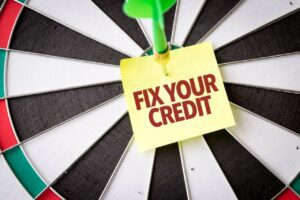When it comes to demystifying your credit score, many Canadians are left scratching their heads. Credit scores may seem mysterious, but it doesn’t have to be that way.
Most people know that having bad credit isn’t ideal. But what factors into your score in the first place? In this article, we’ll look at how organizations calculate your credit score, what’s your credit score number, and if it’s possible to have a 0 credit score.
What is a credit score?
Your credit score is a number that is assigned to you, based on information on your credit report. The information on your credit report reflects how well you’ve handled credit in the past. The lenders use this information as an assessment of risk when lending to you in the future. The credit score number that you are assigned is used by lenders to determine if you qualify for credit. They will also use it to determine what kind of interest rate you’ll have to pay and if there are any other conditions that are attached to the debt that you are taking out.
How your credit score is calculated
If you’re naturally curious or experienced credit rejection, you’re probably wondering how the major credit reporting agencies calculate credit scores.
Different lenders may use different credit scoring models. Regardless of the types of credit scoring models used, it’s important not to get overly concerned. Having at least a basic understanding of the factors is far more critical. When you do, you can take the necessary steps to improve your credit score.
Here are the five factors that influence your credit score.
Your Payment History
Your payment history carries the most weight in terms of your credit score. It usually accounts for 35 per cent of your score. When you pay your bills on time, this can boost your score. However, if you’re late with paying your bills, this can hurt your credit score range.
Your Credit Utilization
Credit utilization is just a fancy way of saying how much you owe. Are you close to being maxed out on your revolving credit accounts? If you’ve got several cards and credit lines all close to the limit, this will negatively affect your credit score.
If you have a lot of other debt obligations, this could drag down your credit score further. That’s because lenders see you as a higher risk of default when you’re close to your credit limits.
Your credit utilization is almost as important as your payment history. It accounts for about 30 per cent of your credit score. Watch Your Credit Utilization. On revolving credit like credit cards, it’s best to avoid going over 50 percent of your available credit. When you go over that threshold, it can start to drag your credit score down.
Your Credit History
If you’re new to credit, you won’t have much credit history (if at all). This makes it more challenging for lenders to figure out how you’ll handle paying debt responsibly. For that reason, you’ll start with a lower credit score until you can prove that you’re able to manage credit responsibly.
On the flip side, if you have a more extended credit history, it will increase your credit score. Lenders look to see how long you’ve had credit accounts open.
Credit history accounts for about 15 per cent of your credit score.
Number of Credit Inquiries
Opening or applying for too many credit accounts in a short time can be a red flag to lenders. Lenders may see it as a higher risk, and it may lower your credit score. When you apply for a loan with many different lenders, it shows that you may be having difficulty qualifying.
(And contrary to popular belief, checking your credit scores won’t lower them.)
Credit Mix
Lenders generally want to see you have a healthy mix of credit. However, when you have just one credit type, it can lower your credit score. Try not to sign up for credit you don’t need, but don’t sign up for a single credit type either.
What is a good credit score?
A good credit score can range on the low end from 300 to a high of 900. For most lenders, a score of 650 is the baseline for qualifying for credit. Anything below that magic number and you may have trouble getting credit from traditional lenders. They may review your credit score when you’re applying for credit, renting an apartment, or applying for a job. It’s essential to have a basic understanding of credit because we depend on it so much.
It’s a good idea to get in the habit of reviewing your credit report and credit score at least once a year. It’s also a good idea to review it at least six weeks ahead of applying for a significant loan, such as a mortgage or car loan. By regularly reviewing your credit report, you can make sure it’s accurate. You can also monitor it and take steps to improve it.
Is it possible to have a 0 credit score?
No, it’s not possible to have a 0 credit score, although it is possible to have zero or no credit score. Let me explain.
Credit scores with the major credit bureaus range between 300 and 900. As such, it’s not possible to have a credit score of 0 since 300 is the lowest score you can have. It is possible to have no credit score. Here are some of the reasons why you might not have a credit score.
You’re New to Credit
If you don’t have any credit accounts, such as a credit card or line of credit, the credit bureau won’t have enough information to calculate a credit score for you.
You’re New to Canada
If you’re a new immigrant to Canada, you have to rebuild your credit score. Unfortunately, your credit history in your home country won’t be taken into consideration in most cases in Canada.
You Haven’t Used Credit in a While
If you have a credit card and use it regularly, you should have a credit score. But if you stop using your credit card for whatever reason (i.e., you decide to start paying in cash or with your debit card), after a while, there won’t be enough data to calculate a credit score for you.
Ways to maintain or boost a credit score:
Don’t be overly concerned about the different types of credit scoring factors out there. Instead, focus on getting the basics right like
- Always pay bills in full and on time
- Avoid going over the credit limit on credit cards, lines of credit and retail accounts
- Have low credit utilization by keep balances well below the limits
- Reduce the number of credit applications made to one lender at a time
- Build credit history
Credit Monitoring
By signing up for free credit monitoring, you can keep a closer eye on your credit activity. It also helps you spot and report identity theft right away.
Reviewing your Credit Score
Ask a group of people if they have ever checked their credit report, and likely the response will be “no”.
“We are advocates of everyone checking their credit reports on an annual basis,” says Jeffrey Schwartz, executive director of Consolidated Credit Canada, Inc. “It is important to review the document for accuracy especially since the report is the basis for qualifying for a mortgage, car loan and for now, a good rate on your home insurance.”
It’s also a good idea to review it at least six weeks ahead of applying for a significant loan, such as a mortgage or car loan. By regularly reviewing your credit report, you can make sure it’s accurate. You can also monitor it and take steps to improve it.
If you do find errors or need to dispute an item on your credit report Consolidated Credit offers the following advice:
- Contact Equifax Canada and TransUnion Canada annually to request your free copy of your credit report.
- Verify your personal information is up-to-date.
- If you find a discrepancy dispute it yourself.
- Send letters, in writing, to the credit reporting agencies and the credit grantor.
- Keep records of any phone conversations, emails, etc. to refer back on.
- Keep your letter brief, describe the problem exactly, suggest a solution, and send the letter registered or use a courier to get a confirmation of receipt.
- Attach any documents that will prove the information is incorrect – copies of paid statements, etc.
For more information check Consolidated Credit’s advice on how to repair your credit.
Are you still having trouble demystifying your credit score? Call Consolidated Credit Canada today to speak to a trained credit counsellor.




